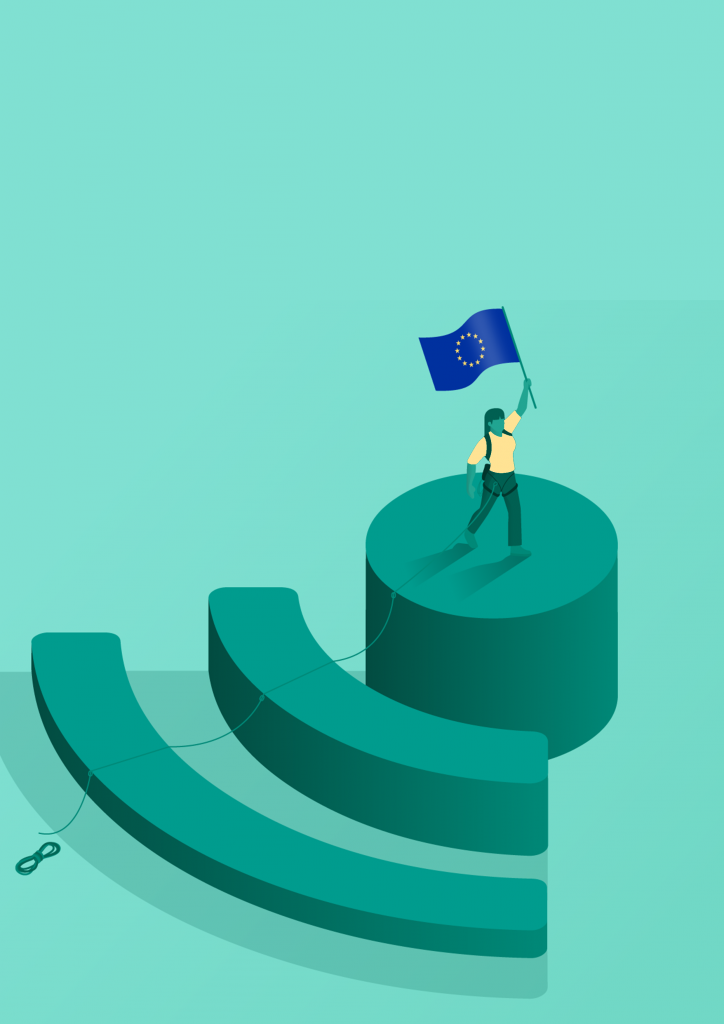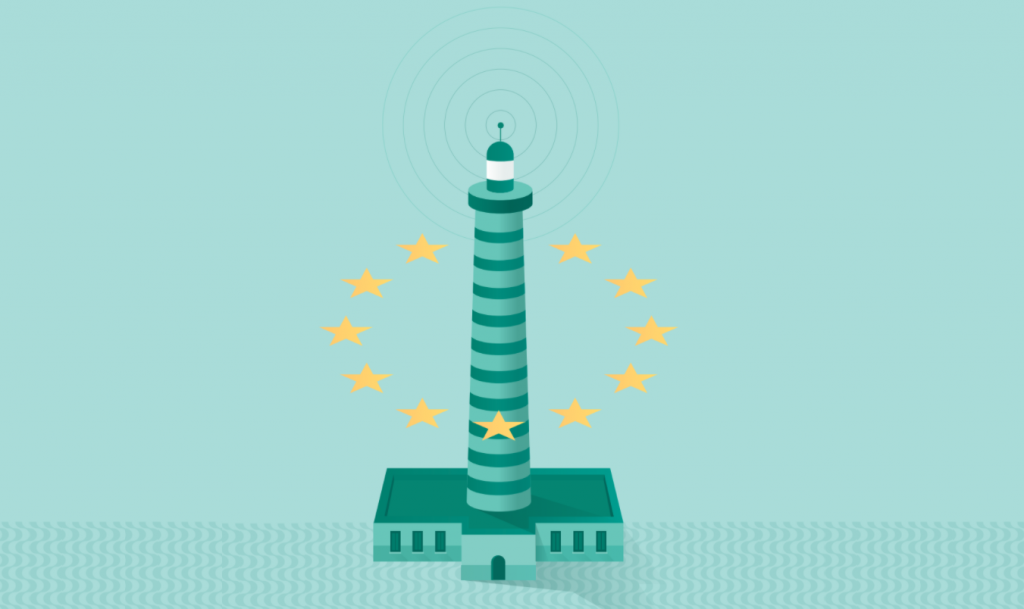Katja Bego, Principal Researcher, Nesta
September 28, 2020
Introduction
The internet has changed. While early internet pioneers dreamed of an open, free and decentralised internet, the story of the internet today is mostly a story of loss of control. Just a handful of companies determine what we read, see and buy, where we work and where we live, who we vote for, who we love, and who we are. Many of us feel increasingly uneasy about these developments. We live in a world where new technologies happen to us, rather than for us; a world in which citizens have very little agency to change the rules.
But things do not have to be this way. Despite the growing clamour of voices who wish we could just pull the plug, we believe that the internet is still a force for good. But now more than ever, we must work hard and take decisive action to harness its full potential. Europe has an urgent opportunity to take charge of these efforts through the transformational Next Generation EU post-pandemic recovery plan, which has at its heart the goal to kickstart the green and digital transition, ensuring the long-term sustainability of Europe’s communities and economies. Repairing the internet and preserving the integrity of systems should be a central tenet of these ambitions. In a digital sphere that is becoming increasingly fragmented and contentious — at time of writing, the emergence of a fully-fledged splinternet appears closer than ever — such forward-facing and value-led leadership is vital.
To help give shape to these efforts, we are today releasing a working paper, which sets out a tangible vision for a more democratic, resilient, sustainable, trustworthy and inclusive internet by 2030, and identifies the concrete building blocks — policy interventions and technological solutions — that might help get us there.
This blog provides shorter summary of A Vision for the Future Internet, our in-depth working paper which was developed by Nesta as part of the Horizon2020-funded NGI Forward project. NGI Forward acts as the policy and strategy arm of the European Commission’s flagship Next Generation Internet (NGI) initiative, which sets out to build a more human-centric internet by the end of the decade. While the paper does not necessarily reflect the opinions of the Commission, it forms part of our project’s overarching recommendations for the NGI and future European internet policy.
1.1 Europe’s role in shaping the future internet
Europe has often been presented as one of the lone powerful voices still championing digital rights and the open internet in an increasingly fragmented digital sphere, a third way between Silicon Valley and Beijing. While this has proven a helpful heuristic to articulate an alternative and strike the right balance between unbridled private sector-led innovation and government oversight, reality is a lot more complex. Much like the world around us, the internet is becoming increasingly chaotic and multipolar, with a multitude of actors, private and public, trying to transpose their own visions for the future onto it.
Amidst these duelling narratives and objectives, the European Union needs to more
proactively chart its own path. We must become better at articulating what we want,
rather than diagnosing (and retroactively regulating) what we do not want to see. As
global tensions rise, countries and companies retreat behind their own walled gardens,
and existing economic and political paradigms are challenged as a result of the
impacts of the pandemic and the longer-term threats of climate change and inequality,
Europe finds itself at an important crossroads.
Driven by fears of falling
behind, a growing number of voices in Europe are promoting rash approaches to bolster
the bloc’s own industrial strategy: rapidly creating national champions (“picking
winners”) and diverting large amounts of funding to support the most hyped
technologies, with ethics an afterthought. While it is indeed important that Europe
boldly invests in taking the lead in shaping newly emerging industries, this rush to
compete should not come at the expense of championing European values, one of our
unique strengths.
Conversely, our value-led approach should also not lead to inaction, where the development of ethics frameworks and principles can sometimes get in the way of taking tangible steps forward and building alternatives. We instead advocate for a long-term approach geared towards setting the right conditions for new public-interest innovation to thrive; an approach that aims to embed the values we hold dear into our infrastructure and the next generation of technologies that will form the future backbone of the internet.

From market taker to market shaper
The European Union’s strengths in the digital arena are well known, from our
regulatory power — the sheer size of the Single Market and strict standards mean the
bloc gets to set global rules, harnessing the so-called Brussels effect — to our
reputation as a trustworthy, values-led actor, to the dynamism of our bottom-up
innovation ecosystem. These strengths, however, can be used more effectively to not
only steer existing markets into a more favourable direction, but also proactively
shape the development of new innovation. Internet sovereignty, both on the individual
and continental level, can only be achieved through taking charge of the future
trajectory of technological development and building our own alternatives.
In
this paper we propose a wide-range of interventions that seek to do just this.
- We create the infrastructures for public-interest innovation to thrive. Our ambition should not be to create our own European Google; we need to focus on setting the conditions that prevent the next Google instead. We do this by, for example, proactively building technical systems to underpin a new data economy built on principles of sovereignty and decentralisation of power, and strengthening responsible, accountable business models.
- We empower policymakers from the local level up to take charge of the direction of innovation. For the Next Generation Internet to be a success, it should not just be a top-down, but also a bottom-up initiative. We therefore actively involve policymakers from the city and regional, to the national level and up, and empower them to take shared action, scale successful local interventions and prevent constant reinvention of the wheel, as well as to put their own regulatory and spending clout — for example through public procurement — at the service of strengthening markets for alternatives that serve the public good.
-
We promote institutional innovation and new governance models. The
unprecedented scale and complexity of the digital economy has meant not all of our
existing regulatory and competition frameworks are still fit-for-purpose to respond
to the challenges it has brought to the fore. New models, such as more flexible and
future-facing anticipatory regulation models and experimentation with more hands-on,
independent public bodies could help bolster the internet policy toolbox.
To bring direction and cohesion to all of these efforts, we propose unifying the ambitious objectives of the Next Generation Internet initiative into one single mission, to sit alongside the moonshot missions previously defined by the European Commission under the upcoming Horizon Mission framework. Taking such a mission-based approach will empower policymakers and the public sector to take a holistic view, articulate a compelling European story, and mobilise the right actors in Europe’s diverse technology ecosystem to bring about the changes we want to see.
2. Where are we now: addressing challenges across the stack
For such a mission-based approach to be a success, we need to understand the reality
we are operating in, and the possible futures we might be heading towards. The
challenges facing the internet today are fast-evolving and incredibly complex. The
multilayered, intertwined nature of the global internet means we need a clear picture
of how the various slices and layers of the system interact, and understand who the
key actors driving developments are.
Before we head into the vision and
mission part of this paper, we therefore conduct an in-depth mapping of the current
issue landscape. We do this by considering challenges layer-by-layer, reimagining the
traditional technology stack as a layered system of both social and technological
infrastructures. In this model, these layers are not defined by their importance to
making the internet work from a technical point of view, but by the powerful forces
driving them. Figure 1 provides an overview of this model, and key issues.
As
we explore these challenges, patterns begin to emerge: the self-reinforcing nature of
extreme centralisation of power and resources, lack of transparent and effective
governance processes, and challenges that come with increased scale and demand. We
need to get at the root of these dynamics, and break the vicious circles that
perpetuate them.

3. Where do we want to go: five visions for 2030
In this section, we move away from diagnosis, towards a positive vision for what could
be by 2030. The COVID-19 crisis has given us an opportunity to press pause and
reassess our priorities. During this time of great uncertainty, rapid change and
moving goalposts, a coherent and shared European vision can serve to guide otherwise
heterogenous policymaking and funding decisions towards a common set of goals and
steer Europe’s recovery to meaningfully address the twin challenge of greening and
digitally transforming our economy.
It should be noted that this vision —
while ambitious and sometimes necessitating a radical rewiring of the internet’s very
foundations — is grounded in reality.
There is no need to pull the plug and start from scratch. The future
we paint can emerge as a product of tangible and realistic interventions. The
European Commission, working in collaboration with the European Parliament, Member
States, regions and cities, has the competencies and means to act on this vision,
harnessing Europe’s regulatory power, global position of trust and existing, strong
innovation ecosystem.
Our five visions are built along five pillars:
democracy, resilience, sustainability, trust and inclusion, values at the core of many of the most important societal
problems we face today. These five pillars were informed by rigorous analysis,
combining stakeholder dialogue and robust data-driven analysis conducted by the NGI
Forward consortium. The detailed rationale for this selection, as well as a reflection
on the trade-offs we face when selecting key values, and the tensions such a
prioritisation inevitably brings to the fore, are discussed in more detail in our
longform paper.
Each pillar is accompanied by a tangible mission we believe
can at least in part be achieved by 2030.
Democracy
We democratise the internet by giving citizens control over their data and future trajectory of innovation, and create a single market for ethical data use and technology worth 1 trillion Euros by 2030.
Power over the internet is concentrated in too few hands. Citizens should have more ownership over their own personal data and online identity, and a real voice in the development of new innovation. Building a more democratic internet also means levelling the playing field in the digital economy, allowing more actors to meaningfully compete, and initiatives that serve the public interest to thrive.
In our vision for 2030, we directly address the root causes setting in motion the
current vicious cycle towards ever more centralisation, by opening up access to data,
bolstering alternative, fairer business models, and harnessing the true power of the
internet as a democratising force.
Democratising data
The European Commission’s Strategy for Data calls for the
development of sector-specific data spaces to ensure Europe does not miss the boat on
industrial data, like it has with personal data. We however believe there is also
still an opportunity to reshape the market for our own valuable information. In our
vision, these data spaces are therefore also extended to include Europeans’ personal
data, leveraging innovation in online identity and data commons ownership models to
ensure we preserve individual privacy and agency.
By
issuing every European their own self-sovereign online identity and
personal data store (data wallet), citizens can now better understand
and control how their data is shared and used, and can provide their personal
information across solutions on a case-by-case basis. This model also gives a boost to
smaller businesses and those who do not want to rely on indiscriminate data-hoovering
as their business model. Where previously only the largest technology companies had
access to big quantities of user data, now any solution can tap into this
vast, decentralised data lake on equal terms.
Alongside
these new technical infrastructures, there is a real need for
more proactive, future-facing regulation in the privacy realm, and
fit-for-purpose competition policy frameworks that can address the
unprecedented accumulation in the digital economy.
Protocols not platforms: interoperable ecosystems
We will strengthen the emerging ecosystem of solutions built
on top of this proposed decentralised data commons infrastructure, by using public
sector purchasing power to set high standards for interoperability for any solution we
fund, and making the rules for data portability and interoperability more concrete
through more specific regulation.
We develop a common approach, together with the practitioners community, with regards to interoperability and data portability, which any related R&D project is required to follow as a condition for receiving government funding. With time, we foresee this model could lead to the creation of a whole host of fully-interoperable applications and solutions, preventing lock-in and enabling users to carry their data and online identities with them across apps and tools, which now work together more efficiently.
Collective intelligence and public engagement in shaping technology
The rapid pace of technological development has led to increased fears about its
potential negative impacts, from automation-induced mass unemployment to dystopian
facial recognition systems. It is therefore no surprise that we see growing opposition
to some of these emerging technologies and further digitalisation more generally. In
our vision, we see the involvement of citizens in decision-making about the trajectory
of innovation as key to not just increase
public acceptance of emerging technologies, but also to ensure the
connected solutions we develop effectively serve the public good, meet users needs,
and avoid potential harms. We will make involving diverse perspectives through
public engagement and user testing a key component of any
government-funded R&D effort.
Involving a wider range of voices will
also allow us to better tap into the expertise of the crowd, harness
collective intelligence, and so ultimately produce better, and more
creative outcomes. Open-access, open innovation and open science will be the new
leitmotif.
Digital democracy and strengthening the open internet
Democratising the internet means ensuring the internet remains open and a place where
everyone can have their voice be heard without political interference. It also means
being more deliberate about using the tools the internet provides to rejuvenate our
democratic institutions. In our vision for 2030, the European Commission leads the way
in employing more
digital deliberation solutions and online democracy solutions into
its own institutional processes, including regular Conferences on the Future of
Europe, and promotes the adoption of similar approaches on a local and national
level.
We similarly see these tools effectively used to have a collective
conversation about the future of the internet itself, allowing local communities to
come together and take shared decisions about the role they want digitalisation to
play in, for example, shaping their cities and towns.
The European Commission
will also play an active role on the world stage preserving the open internet and
freedom of speech. One way of doing this is through supporting the development of
trustworthy and secure encrypted tools that allow for healthy political conversation
and organising, funded through the establishment of a trusted fund inspired by the
American Open Technology Fund.

Resilience
We build internet infrastructure and systems that can withstand environmental, economic and cyber shocks, and strengthen our role as a global champion of good governance and the open internet.
A human-centric internet also needs to be resilient in order to ensure the continued
reliability and sustainability of its networks and social infrastructures. Mounting
cyberthreats, climate shocks and rising demand impact different layers of the system,
and require renovation and more secure processes to remain robust.
Resilient infrastructures
While the internet’s underlying systems have so far held up
remarkably well during the COVID-19 crisis amid increased demand, we might not be so
lucky next time. Climate change-induced extreme weather events and shocks will become
more frequent, and also geopolitical conflict is likely to be a growing source of
man-made disruption to systems. We will make substantial
strategic investments to improve the internet’s physical
infrastructures by updating outdated systems, and design and deploy systems that can
withstand these new types of pressure and risk.
To ensure the internet’s underlying systems remain fit for purpose and can withstand
rapidly rising demand, we support more proactive systems maintenance and updating of
existing protocols and infrastructures, many of which were not initially designed with
the future scale and complexity of the internet in mind.
A champion of good governance and the open internet
With signs of splintering and the erection of walled gardens picking up pace around
the world, Europe is one of the few remaining powerful voices still championing the
open internet (though, it should be recognised, has itself also at times been an actor
in furthering fragmentation).
In our vision for 2030, Europe takes a more
active role in strengthening global norms and standards in the
internet and technology space. This means taking the lead on bolstering global
governance rules around cyberconflict, still a worryingly under-governed domain,
through the development of a series of international treaties covering cyber conflict
and the newly emerging class of cyber weapons. It also means continuing to vocally
advocate for multistakeholder approaches in internet governance, and
continued open, diverse dialogue to ensure continued interoperability between various
global regulatory and standards regimes when trust is at a nadir. Making governance
processes more accessible to otherwise underrepresented groups, particularly in the
global digital rights and civil society realm, forms another piece of this
puzzle.
We see setting high standards for transparency and
auditability of technology systems sold within the European Single Market as a further
tool for instilling a degree of trust in the global innovation ecosystem. A launch of
an independent technology auditing body can make this
concrete.
Cyber-resilience and technology sovereignty
We
should become more deliberate about protecting critical European infrastructure
through stronger regulation for businesses and substantial investments in
cyber-security across member states, as well as diversification and, where
appropriate, relocalisation of production supply chains.
Achieving technology sovereignty needs to not be a protectionist
effort. Rather, we should invest in building
open, decentralised infrastructures and common-good resources the
rest of the world can benefit from, such as an open European Web Index or a common
model for online identity. The leitmotif here is to lay the conditions for new
initiatives to thrive on top of, rather than creating new, centralised verticals which
themselves will come to dominate the market.
Sovereignty is not just about
reducing technological dependencies, but also about building up human capital. We grow
Europe’s cybersecurity capacity, and broader technology development
base, through an ambitious retraining programme, building skills within organisations
and among the general public, as well as recruit more multidisciplinary tech talent
within the various layers of government. Building up in-house expertise not only
allows governments to develop more robust solutions internally, it has the added
benefit of equipping ourselves to
better anticipate developments and practice foresight, improving longer-term
resilience.
An open-technology revolution
In our vision for 2030,
governments across all layers of jurisdiction — from the regional and city level, all
the way up to the Commission itself — adopt an
open-technology-first approach. This means solutions are built on top
of open standards and, where appropriate, open sourced. Taking this kind of approach
has many advantages: it can help to create a market for alternative, non-extractive
solutions, lead to more robust and adaptable technology, and increases government’s
bargaining power, no longer locked into expensive proprietary tools.
We
kickstart these efforts by launching a co-owned
FOSS and Open Standards fund, which plays a triple role of sharing
learnings and best practices among various government bodies, funding and supporting
the development of new solutions, and funding the maintenance, updating and continued
stress-testing of existing tools.
This FOSS and Open Standards fund can
play an important role in normalising the use of open source technology in more formal
settings, and help find the open source community another fruitful pathway to funding
their work.

Sustainability
We move to a fully circular and carbon-neutral economy for digital technology by 2030, strengthening the joint objectives of Europe’s twin green and digital transition.
Digitalisation has an important role to play in addressing the climate emergency and making the ambitious objectives of the European Green Deal a reality. But we must also not forget about the internet’s own substantial environmental footprint. As a society, more of us than ever before are using the internet, using more devices, and using these devices in ever-more energy intensive ways. While we see this additional connectivity as a great good, it comes at cost. Living within planetary bounds means striking the right balance between these two conflicting forces.
A fully circular economy for digital devices
We
set ourselves the goal to create a fully circular economy for digital technology by
2030. Europe will become a global frontrunner in developing greener devices and
manufacturing processes,
optimising both the lifespan and durability of devices themselves, as
well as limit the environmental footprint of their production. We will enforce bold
Right to Repair legislation, and take action against planned
obsolescence and lack of long-term software support.
By ensuring the
sustainability of hardware, the greatest contributor to the internet’s footprint
across the value chain, and investment in
improving urban mining and recycling processes, we can substantially
reduce the internet’s environmental impact and reduce e-waste, the fastest growing source of waste in Europe. We will in the process also
contribute to strengthening Europe’s technology sovereignty by reducing supply chain
dependencies and reliance on morally questionable and increasingly
geopolitically-fraught imports of input resources such as rare earths.
Data minimisation
As internet
use continues to grow rapidly, the storage and transport of data is accounting for an
ever-larger share of global energy supplies. The European Commission has already set
itself the goal that
all data centres in Europe should be climate-neutral by 2030. We will
actively encourage other countries and companies outside of the EU to follow suit. In
doing this, we will move away from the language of net-zero, which
can be propped up by emissions trading schemes of questionable efficacy, and towards
concrete emission reduction targets.
We do not stop there, but also become more conscious about the types and quantities of data we collect. Redeploying the principle of “data minimisation”, as enshrined in the GDPR, in a sustainability context, moves us into a new paradigm where we deliberately reduce the amount of data we keep and store to only those datasets that are actually beneficial, not just to enhance privacy, but to reduce strain on the environment.
Conscious connectivity
Public awareness about
the environmental impact of our individual internet consumption remains limited. We
therefore popularise an ethos of “conscious connectivity”, where we as consumers become more mindful of our individual digital footprint, aware that an extra hour of video streaming or storing another twenty photos is
linked to tangible CO2 emissions.
This increased public awareness can spur
a flourishing of green innovation, as technology companies respond to
consumer demand for zero-emission lifestyles. The European Commission further seizes
on this momentum by increasing investment in green digital innovation by launching a
dedicated fund, supporting previously understudied areas such as
green search and less energy-intensive machine learning methodologies.
Digital tech and the European Green Deal
By
addressing the internet’s substantial environmental footprint, we can now more
fully harness the power of digital technology to make the ambitious aims of the
European Green Deal and twin transition a reality. In doing so, we can finally move to a future where the ever-elusive smart city —
now in ways still a lofty PR promise — will begin to meaningfully and positively
transform our urban spaces, supported by advances in technologies such as AI and the
hyper-connectivity allowed by 5G and later 6G.
We also recognise that digitalisation is a means, not an end. We therefore become more deliberate in identifying where smart systems and new technologies can truly reduce our environmental footprint, and when non-solutionists solutions might provide the better answer.

Trust
We establish a globally known brand for trustworthy and privacy-preserving technology, and play a leadership role in ensuring citizens around the world have access to trustworthy technology, data and information flows.
From reading an article on social media to making an online payment — trust in and on the internet is vital if we want to make most of its promise. Europe needs more trustworthy models for online interactions, reliable information, data-sharing and identity management, to help prevent further societal fragmentation and polarisation, and ease growing distrust in the geopolitical arena.
A market for trustworthy technology
Leveraging
Europe’s respected role as a global regulator of technology, we can become a more
proactive developer of trusted solutions. In our vision, “Made in Europe” becomes a stamp of quality, signifying technology that is secure
and ethically produced, and embodies principles of privacy-by-design and openness to
scrutiny.
To bolster these efforts, a new
European-Commission-funded and endorsed auditing body will be
launched, which will administer a series of
globally-recognised trustmarks, which are given out to
European and non-European applications and devices that meet this
neutral organisation’s high standards of quality. These trustmarks provide citizens
around the world with accessible and reliable information about trustworthy internet
alternatives that are currently so hard to find.
We combine this approach by setting our own stringent conditions for security, privacy, interoperability and ethical data use in the technology solutions we as governments, from the city-level up to the supranational, procure and fund. This will help further strengthen the market for responsible tools, which currently often fail to gain traction in the absence of more sustainable business models.
What’s going on under the hood?
As technology,
particularly in the realm of algorithmic decision-making and cybersecurity, becomes
increasingly opaque and complex,
we have to improve our understanding of what is going on ‘under the hood’. That is why our fully independent European auditing body described in the previous
bullet, will not just be tasked with administering trustmarks and auditing software
and hardware solutions, but also with developing
standardised processes for scrutiny in the development phase, and
continuous evaluation post-launch, to ensure solutions continue to meet strict
conditions. With time, we could imagine such a body could also
help reduce geopolitical tensions, as new technology could be
scrutinised for potential backdoors.
Saving the news
We cannot have healthy
democracies without a robust information and news ecosystem, that helps keep our
elected (and unelected) officials to account. Unfortunately, it has become
increasingly clear that most news outlets cannot survive using just the current
business models available to them in the digital economy.
We should
thus find new, novel ways of funding online journalism while ensuring our neutrality
as a government — a crucial separation necessary to rebuild public trust. We do this
by levying a dedicated Digital Tax on the large platforms, which
currently benefit disproportionately from the content produced by the struggling media
ecosystem. The proceeds of this tax will in large part be used to fund a dedicated
Centre for Innovation in Journalism. This centre will provide funding to trusted online and print media outlets,
particularly those covering local or smaller language markets, to help them adapt to
the pressures of the digital economy, will spearhead international journalistic
collaborations, and support radical experimentation with new pathways to
sustainability.
Countering misinformation
The spread of misinformation and the
deliberate undermining of democracy through the internet is unlikely to wane in coming
years without meaningful intervention by both governments and the large platforms. The
growing sophistication of the fake news toolbox, such as deepfakes, is likely only to
worsen the problem.
Beyond addressing wider societal
dynamics at the root of some of these issues, such as rising inequality and growing
political polarisation, there are also actions we should take that do fall within the
remit of this paper. We need to better understand which dynamics have made social
media specifically such an effective avenue through which to influence public opinion
and spread conspiracies, and
proactively devise ways that can counter new forms of manipulation,
such as deepfakes. We need to invest in high-quality online journalism, fact-checking
and promote more community-led moderation in the online public
sphere. But we also need to challenge the big platforms to take more active ownership
over countering the harmful speech they facilitate by optimising for engagement and
clicks, potentially through more forceful regulation.

Who am I? Fixing online identity
The identity problem is one of
the internet’s original sins: whereas interactions in the real world allow us to build
our reputation, decide what information about ourselves we share with whom, and
establish mutual trust, the internet does not have a universal, portable model that
allows us to do so. The European Commission in its most recent plans has called for
the development of a trusted online identity for every European — a bold, and
important aim.
But for this endeavour to be most effective, we need to
strike the right balance between centralisation and decentralisation. We propose that
every European resident is issued a self-sovereign online identity
and linked personal data store (data wallet), which they themselves control without
central oversight – which will help instill trust in the system. But to ensure
this decentralised approach is robust, it needs to be paired with the establishment of
an independent, government-funded oversight body, which verifies and
improves upon the underlying technical backbone, and supports trusted organisations in
launching their own services on this infrastructure. Our EDDS framework, as detailed
in the longform version of this paper, sets out an ambitious model for such a
governance system.
Meaningful consent and collective rights
We need to invest more
in the development of new modes for citizens to give
meaningful consent to being tracked
or subjected to data-driven decision-making tools and systems. Consent models fit for
a world where the internet increasingly exists outside of our phones and laptops needs
to establish reciprocity in our relationship with smart city
solutions and other forms of surveillance and tracking, especially in public spaces
and public-service provision contexts. This means both empowering individuals, but
also providing communities, such as local neighbourhoods, the
collective right to challenge decisions or deployment of new tools.

Inclusion
By 2030, all Europeans can meaningfully access and participate in shaping the internet.
We can make the internet itself more human-centric, democratic and resilient, but if we fail to ensure that all of us have equal access, such an internet would not be inclusive or harness the strength of Europe’s diversity. We therefore set ourselves the mission to remove structural and social barriers to access, ensuring that all Europeans can have affordable or even free access to the internet by 2030, and are empowered to use and shape that internet in a meaningful way.
Access for all
In our vision, we treat the internet as important public infrastructure by giving all Europeans the opportunity to get connected to the internet and by ensuring high-speed, affordable broadband is rolled out across the whole of the Union, also in remote and less economically developed areas. The European Commission and member states can also make a significant contribution to removing the physical barriers to internet access elsewhere in the world by investing in roll-out as part of development efforts, and providing funding for experimentation with technologies that might provide connectivity to otherwise geographically or politically hard-to-reach places.
Societal barriers to access
To bridge the
digital divide, we should not just focus on reducing infrastructural barriers to
access, but also look at the more
pernicious social and economic root causes that prevent large groups
of people from fully participating in the digital economy.
We should harness Europe’s full linguistic richness and take the lead on building a
multilingual internet, where also those that speak smaller minority
languages can participate. We need to set stringent conditions in procurement and
funding calls, ensuring new solutions are
fully accessible to disabled users, or those who are not as digitally savvy. We need to broaden access to connected
devices to those who otherwise cannot afford them, especially given the vital role
these have started to play in the post-pandemic world. We must address this digital
divide to ensure we do not perpetuate existing inequalities.
Representation and bias
We are not just proactive users of the internet, but also an object to be analysed by
connected technologies. Rather than relying on corporate self-governance and an
ever-expanding flurry of ethics frameworks, Europe should therefore take the lead in
funding and setting
real legal standards for responsible AI systems, made more concrete
and enforceable by their immediate practical inclusion in procurement and funding
processes from the city-level up. We recognise that the way in which data is
collected, interpreted and used can perpetuate social inequalities and further power
asymmetries, we should thus put in place strict rules for how algorithmic
decision-making tools and similar data-reliant systems can be deployed with public
service contexts, ensuring these systems are
accountable and open to scrutiny, and involve outside
stakeholder oversight when used in particularly high-risk
environments.
Beyond ensuring algorithmic decision-making does not lead to
biased outcomes, we should also enshrine the principle of the
Right To Opt Out into law, which gives citizens the right to be
excluded from government-led data-driven decision making processes, while
simultaneously guaranteeing their views and needs are still being included in the
design of services.
A safe space
In our vision, we make the internet a safer place
for marginalised and vulnerable groups, who are currently disproportionately often
falling victim to online harassment and targeted abuse — an important barrier to
access. This requires stricter and more
fit-for-purpose legal enforcement, but also the promotion of
healthier public discourse and community-led moderation.
We also need to
strike the right balance between online safety and preserving our individual privacy.
We thus invest in, for example, content filters that are compatible
with end-to-end encryption.
Shaping the internet
Many groups are underrepresented in
the technology industry, which does not only mean they miss out on lucrative jobs, but
also see their unique perspectives go unheard in the technology development phase. We
spearhead initiatives that open up skills programmes to marginalised groups, collect
more complete data on diversity to improve accountability and to
better understand ways in which we can address this disbalance, and favour
more representative teams in funding decisions.
Diversity
in the development phase of new solutions is not just about bringing a more diverse
range of technologists on board, but also about hearing the voices of non-experts, and
more multidisciplinary perspectives. Future government-funded
technology, particularly tools used in the provision of high-risk public service
contexts, should therefore undergo rigorous user testing, looking not
just at the direct usability and user-friendliness of solutions, but also at
unexpected societal impacts and less well-understood user needs.

4. Concluding words
In this paper, we have set out a tangible and actionable vision for the future, that helps the European Union articulate a compelling story for a more human-centric future, and consider the trade-offs we face on the path there. We intend for this working document to be a starting salvo, and serve as a call to arms for the European Commision, as well as Europe’s internet community, from national and city-level policymakers to civil society, innovators to the general public, to take concerted action to make these ideas a reality.
For the remainder of the NGI Forward project and beyond, we will work on putting the central ideas proposed in this paper into action, and build a network of like-minded organisations and individuals to join us on this mission.
